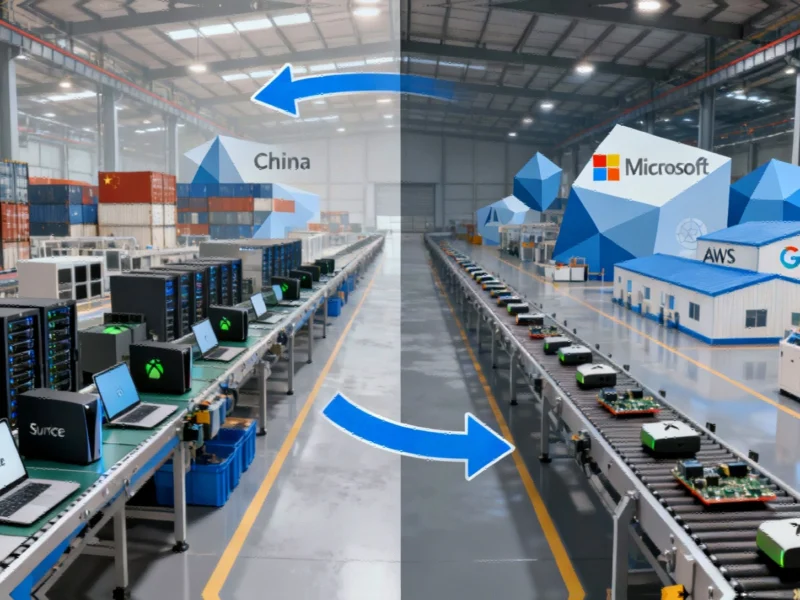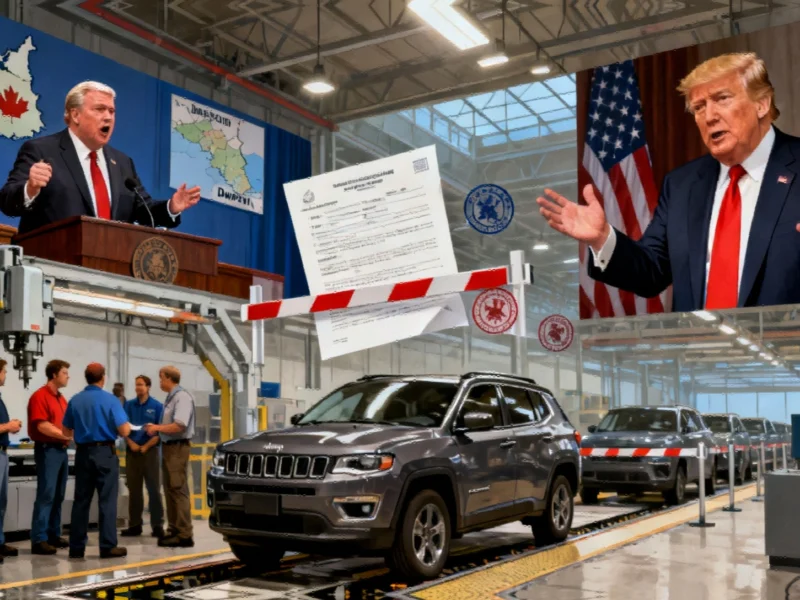TITLE: Tech Supply Chains Shift as Microsoft Accelerates China Exit Strategy
In a significant escalation of the ongoing technology decoupling between the United States and China, Microsoft has joined the growing list of American tech giants actively moving production out of Chinese facilities. According to exclusive reports from Nikkei Asia, the software behemoth has instructed multiple suppliers to prepare for “out of China” manufacturing of its Surface laptops and data center servers, marking a pivotal moment in global tech supply chain realignment. This strategic shift aligns with broader industry trends detailed in comprehensive coverage of the tech exodus from Chinese manufacturing hubs that has been accelerating throughout 2025.
The Microsoft decision comes amid increasing political pressure and trade tensions between Washington and Beijing. Sources familiar with the matter indicate that production of server components will begin shifting as early as 2026, with the company having already moved substantial server manufacturing out of China this year. The relocation of Xbox console production is reportedly next in line, signaling a comprehensive restructuring of Microsoft’s manufacturing footprint across multiple product lines.
Political Pressure Catalyzes Manufacturing Exodus
The tech sector has emerged as the primary battleground in the escalating trade conflict between the world’s two largest economies. Former President Donald Trump’s persistent calls for American companies to decouple from China appear to be gaining traction, with his threatened 100% tariffs on Chinese imports and export controls on critical software creating substantial operational risks for companies maintaining Chinese manufacturing operations. The political dimension extends beyond trade policy, as evidenced by Trump’s confrontation with Intel leadership over perceived China ties, which only resolved when the company agreed to significant U.S. government investment.
This manufacturing shift mirrors challenges faced by other global corporations navigating complex international regulations. European fashion retailer ASOS recently encountered difficulties with German tax authorities over unpaid liabilities, demonstrating how multinational companies must increasingly contend with regulatory pressures across multiple jurisdictions simultaneously.
Industry-Wide Supply Chain Restructuring
Microsoft isn’t alone in its strategic repositioning. Amazon Web Services is currently evaluating options to move AI data center server production out of China while reducing dependence on longstanding Chinese suppliers. Meanwhile, Google has requested that suppliers expand server production capacity in Thailand, indicating a broader Southeast Asian diversification strategy across the tech industry.
The financial implications of these supply chain transformations are substantial. As investment firms like Scott Bessent’s work on significant capital allocations demonstrates, major financial players are positioning themselves to capitalize on the restructuring of global manufacturing networks.
China’s Strategic Countermeasures
Beijing has responded to the pressure with strategic moves of its own. Last week, China tightened export controls on rare earth minerals—critical components for tech manufacturing, particularly computer chips. The new regulations require companies to obtain government licenses before exporting any product containing more than 0.1% China-sourced rare earths. Given that China mines 70% of global rare earth supply and refines approximately 90%, these controls represent a powerful economic weapon in the ongoing trade conflict.
The geopolitical tensions extend beyond trade, with diplomatic relations deteriorating as China condemns UK spy allegations, creating additional complications for multinational corporations navigating the increasingly fraught international landscape.
Regulatory Pressure Intensifies
China has also deployed antitrust actions against American tech companies with increasing frequency. Last month, Chinese antitrust regulators concluded a preliminary investigation finding Nvidia in violation of antimonopoly laws. More recently, Qualcomm faced scrutiny as China’s top market regulator launched an investigation into the company’s acquisition of Israeli startup Autotalks.
These regulatory challenges occur against a backdrop of broader international scrutiny, as former national security officials like John Bolton face their own legal challenges in an increasingly interconnected global political environment.
Practical Challenges of Supply Chain Decoupling
Despite the political pressure and strategic imperatives, completely removing Chinese suppliers from tech supply chains remains operationally challenging. Sources told Nikkei Asia that for companies like AWS, eliminating Chinese suppliers is “very difficult in real practice,” highlighting the deep integration of Chinese manufacturing into global tech production networks.
The complexity of these transitions requires careful strategic planning, similar to how policymakers like Rachel Reeves emphasize the importance of competitive environments while navigating complex economic transformations.
Broader Industry Implications
The Microsoft decision reflects a watershed moment in global tech manufacturing. As companies face compounding pressure from tariff escalations, export controls, and geopolitical tensions, the industry appears poised for a wave of structural changes that could redefine global supply chains for years to come.
This reconfiguration extends beyond consumer electronics to energy infrastructure, where companies like Iberdrola are exploring strategic options for Scottish power assets, demonstrating how global corporations across sectors are reassessing their international footprints in response to changing geopolitical realities.
The accelerating tech exodus from China represents one of the most significant supply chain transformations in recent history, with implications for global trade patterns, manufacturing employment, and the strategic positioning of the world’s leading technology companies. As Microsoft joins other tech giants in diversifying production away from China, the restructuring of global tech manufacturing appears to be entering a new, more accelerated phase.
Based on reporting by {‘uri’: ‘gizmodo.com’, ‘dataType’: ‘news’, ‘title’: ‘Gizmodo’, ‘description’: ‘We come from the future.’, ‘location’: {‘type’: ‘place’, ‘geoNamesId’: ‘5128581’, ‘label’: {‘eng’: ‘New York City’}, ‘population’: 8175133, ‘lat’: 40.71427, ‘long’: -74.00597, ‘country’: {‘type’: ‘country’, ‘geoNamesId’: ‘6252001’, ‘label’: {‘eng’: ‘United States’}, ‘population’: 310232863, ‘lat’: 39.76, ‘long’: -98.5, ‘area’: 9629091, ‘continent’: ‘Noth America’}}, ‘locationValidated’: False, ‘ranking’: {‘importanceRank’: 174039, ‘alexaGlobalRank’: 1756, ‘alexaCountryRank’: 545}}. This article aggregates information from publicly available sources. All trademarks and copyrights belong to their respective owners.



